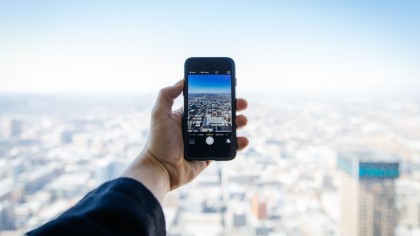How our phones will become our doctors
As sensor technology advances, our phones will become increasingly important diagnostic aids
This information could in turn be used by your phone to suggest certain actions – perhaps telling you there are tickets left for a concert near to you if it senses you're really low on the train home from work. It sounds like science fiction, but the pieces are coming together quickly.
Should we be worried?
It's clear what the medical benefits of many of these future sensors are for the consumer. More sensors mean that apps, and increasingly machine-learning software, will be able to provide us with more accurate, useful and contextual information about ourselves and the world around us.
But the more information that's collected, the more marketers, retailers, healthcare companies and others will want to get their hands on it.

As we explored in our feature on the sensors currently in our phones, the most malicious use of your data is often for marketing and advertising purposes.
Mike Feibus, principal analyst at FeibusTech, told us: "For the most part, those who watch us are in it for the money […]. The most common thing going on in our phones is for marketing purposes. They'd like to understand where we go, what we like. Then the information feeds targeted ad campaigns."
What this means for us as consumers is that we need to exercise caution, and take the protection of our data seriously. Whether that means creating stronger passwords, or adding two-stage authentication, we need to make sure we've left no digital door unlocked.
But what if being sensible and aware isn't enough? Could something as innocuous as not bothering to read allthe terms and conditions attached to a new sensor enable brands to access our medical information?
Get daily insight, inspiration and deals in your inbox
Sign up for breaking news, reviews, opinion, top tech deals, and more.
If, for example, your data was stolen and your health insurance company got hold of it, your policy could be cancelled. Or if an employee saw your private medical history, it might dissuade them from keeping you on.
Yes, these examples sound extreme, but a number of companies are already setting up corporate wellness programmes, and are requiring their employees to share wearable data. So while this sort of data gathering may seem rather Orwellian, it isn't hard to believe it'll become standard practice for companies keen to get a better understanding of who they're employing.
And what about giving your data to small start-up companies because you want to be an early adopter of the next big health trend? The Internet of Things space is becoming increasingly competitive, so getting a product into your hands before someone else does might be more of a priority for companies than ensuring your data is safe.
What happens if that firm goes out of business? Or if you want to delete your information one day? As we demand more from our phones, we'll also need to demand greater transparency about who has access to our personal data, and how it's used.
Policy-makers, meanwhile, will be expected to create guidelines and laws regarding what is and isn't ethical when it comes to our sensitive information.
All this is still a long way off, however. And providing that safeguards are in place and we're aware of what can and can't be done with our data, smartphone and wearable sensors will one day be capable of providing us with vast amounts of information that will help us to improve our physical and mental health.
Becca is a contributor to TechRadar, a freelance journalist and author. She’s been writing about consumer tech and popular science for more than ten years, covering all kinds of topics, including why robots have eyes and whether we’ll experience the overview effect one day. She’s particularly interested in VR/AR, wearables, digital health, space tech and chatting to experts and academics about the future. She’s contributed to TechRadar, T3, Wired, New Scientist, The Guardian, Inverse and many more. Her first book, Screen Time, came out in January 2021 with Bonnier Books. She loves science-fiction, brutalist architecture, and spending too much time floating through space in virtual reality.
